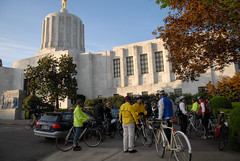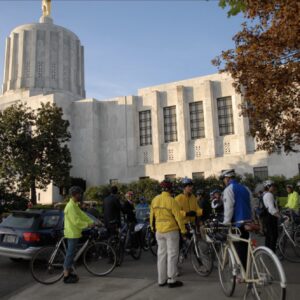“We are coming out of a legislative session that really hurt us, so we need to rebuild our core support and rebuild our base in order to be able to pass something… particularly fighting the backlash and hatred that some folks feel about bicycles.”
— Rob Sadowsky, BTA Executive Director
With the 2011 Oregon legislative session nearly underway (committee meetings begin mid-December), the Bicycle Transportation Alliance (BTA) has decided on their course of action; and it’s a lot less ambitious than the wish list they unveiled back in March. Coming off a 2009 session without any significant new bike laws being passed and with a new leader coming to the helm in June, the BTA will use the 2011 session to as a building block that will (hopefully) set them up for larger gains in 2012.
“It’s clearly a building year,” BTA Executive Director Rob Sadowsky commented during a phone interview this morning. “Starting [his position with the BTA] in June made it difficult to build a consensus around an agenda.” In addition to not having adequate time to prepare major legislative initiatives, Sadowsky says the BTA (and biking in general) is still stinging from an acrimonious and largely unsuccessful 2009 session:
“We are also coming out of a legislative session that really hurt us, so we need to rebuild our core support and rebuild our base in order to be able to pass something… particularly fighting the backlash and hatred that some folks feel about bicycles. This will be more of a reactive year than a proactive year, rebuilding faith and trust and building the machine so we can be effective next year.”
Sadowsky says their legislative agenda, which is slated to be approved by the Board of Directors on December 7th, will consist of only two “small tweaks” to existing Oregon laws. First, the BTA wants to add Driving while Suspended/Revoked (OR 811.175) as a violation that subjects a driver to the Vulnerable Roadway User process. Currently, the VRU law is only triggered after someone is charged with “careless driving“.
The other small tweak the BTA will work on is to pass an amendment to the citizen-initiated citation process to make it more, “simple and accessible” according to Sadowsky. ORS 153.058 gives any Oregon citizen the right to initiate charges of a traffic (or other) violation against another party (including the police). Even though it has proven to work on several occasions, the process is unwieldy and is not widely put to use.
To help rebuild relationships with legislators and fight some of that “backlash”, Sadowsky says their main push in Salem this year will be a “call to action”. The BTA will call on the Oregon Senate and House to hold a joint hearing on traffic safety focused on the Vision Zero campaign. The plan is to educate lawmakers and position improved safety as a key goal that will build momentum for the 2012 session (starting this year, the Oregon legislatures meets annually). The BTA will organize traffic safety experts to visit Salem and testify about best practices both in the US and in Europe.
Sadowsky says the hearings will be part of an effort to build bipartisan support for strategies that they’ll introduce in 2012.
With new transportation funding sources likely to be a big issue this session, Sadowsky says they’re already preparing for bills that will look to make bicycle operators “pay their fair share”. He says the BTA has already heard bike tax and bike registration ideas being floated in various committees. Here’s how the BTA is prepping for these “attacks”:
“We want to make sure we’re well positioned to know where those attacks are coming from and making sure we can react to them. We’re also trying to build relationship with people likely to bring up user fees… making sure when we’re talking about fees, we’re talking about weight, carbon, VMT [vehicle miles traveled]; and not talking about non-motorized users.”
The issue of who will handle the BTA’s legislative work in Salem is still up in the air. Unlike years past, the BTA does not have a Government Affairs or lobbyist on their staff (a position held formerly by Scott Bricker and Karl Rohde). Advocacy Director Gerik Kransky will manage the legislative effort, and long-time volunteer and Legislative Committee Chair Doug Parrow (who lives in Salem) will also do some lobbying. The BTA is looking to hire a paid lobbyist to handle their legislative heavy-lifting, but they have yet to make the hire.
— Stay tuned for more coverage of the upcoming session. For more stories on this topic, check our 2011 Legislative Session tag.
CORRECTION: This article initially said that the BTA would work to add distracted driving as a trigger for the Vulnerable Roadway User law to go into effect. I have since learned that is not the case. They want to add Driving While Suspended/Revoked as an additional trigger for the VRU law. The article has been corrected.







Thanks for reading.
BikePortland has served this community with independent community journalism since 2005. We rely on subscriptions from readers like you to survive. Your financial support is vital in keeping this valuable resource alive and well.
Please subscribe today to strengthen and expand our work.
Who does the BTA plan to ally with for the 2011 session? Part of the reason these pushes aren’t working is because the legislature doesn’t see cyclists as a large and influential group worthy of attention. How does the BTA plan to address that? What organizations will the BTA work with in order to shape the legislative agenda. How does the BTA intend to “rebuild” relationships?
Also, does the BTA believe it can push legislation in 2012 given the much shorter session?
good questions Matt. Specifically, Sadowsky said they plant to “support” the efforts of PBOT (20 mph speed limit on bike boulevards) and the Willamette Ped. Coalition (who he says will look to change/strengthen the crosswalk law).
Why not show the numbers by scheduling a cycling rally around the capital. The second rule of politics (after money) is knowing how to count.
The 40th Anniversary of the Bike Bill will be in 2011.
We will be co-hosting a Bike Summit in Salem in the late Winter/early Spring to show the support. We are working with several partners including Cycle Oregon, Community Cycling Center and the Willamette Pedestrian Coalition to build this summit.
How about a legal definition of a sharrow? Does it make it more legal to take the lane?
You can take the lane if….the lawyer’s favorite, “other conditions that make continued operation along the right curb or edge unsafe”. ORS 814.430(2)(c).
http://www.stc-law.com/rightotheroad.html
Thus most lanes with a sharrow=take the lane.
People can always lobby on their own without the BTA being involved. Just find someone like Jackie Dingfelder, Mike Dembrow, or Ben Cannone in Salem. See if they will update the ORS. A sharrow means there is a condition such as 814.430(2)(c).
What about the cycling lawmaker in Salem who shot off his gun?
It would be nice if the BTA shared a post mortem with members about why the 2009 session was a loss for cyclists. Democrats had control of the Oregon House, Senate, Att. Gen, Governor and every office. Goes to show that those same democrats are ready to take out $10 billion in loans to build the CRC.
Hey, maybe if we act really nice and don’t offend anybody we’ll maybe be able to get what we want a couple of years down the road? Is the DNC writing the BTAs strategy these days? You don’t make progress by bending over to please your opposition, you make progress by pissing people off and working for a future that should already be, right now, not years down the line. Show some spine, BTA. Building bipartisan support is the rallying cry of the defeated, you know this and we know this.
Is that a fair criticism? First off, nowhere in that article does it talk about the BTA building “bi-partisan” support. As you rightly point out, with democratic control, the BTA still did not move much in 2009 – that may be part of what Sadowsky means about needing to “build core support”.
The BTA relies on donations to do the job, and on their members and board to provide overall direction for the organization. If you feel the BTA should be more agressive, and pissing people off, then I have to ask – are you a member? Have you emailed Rob Sadowsky and expressed your opinion? Have you emailed Stephen Gomez, the chairman of the BTA’s board? There’s a place both for working with the legislature and for kicking its ass. An established 501(c)(3) like the BTA is probably going to be more effective at the former. Grass-roots groups will be more effective at the latter. The BTA is going to follow the direction of its board and its members.
If you REALLY want to influence the BTA, go down and volunteer. Get to know the staff, have some discussions on issues. An organization is just people. People have opinions. Organizations are shaped by those opinions and the best way for a single individual to contribute their opinions is to get involved.
“Starting [his position with the BTA] in June made it difficult to build a consensus around an agenda.”
This is why I’m a former BTA member. June to the end of November is 5 months!
How long does it take to build a consensus?
Post a note on bikeportland.org, with a list of the bills that didn’t pass in previous sessions. Invite people to send emails to the BTA indicating their support and whether they’d be willing to testify in favor of a proposed bill. Invite people to submit their own ideas for bills. Or do the same sort of thing on facebook. Find a pro-bicycling legislator, such as Tobias Reed, to sponsor the bill, or the top 3 bills, that got the most support.
Possible bills I can think of with about 10 minutes of thought:
Repeal 814.420, the mandatory side-path law.
Stop as yield.
Vehicular homicide.
Consider this: The BTA just added people to their board. They’ve replaced more than 1/2 the staff in the last year, including their Executive Director, their admin person, their advocacy head and their development and finance heads. So, you have a half-dozen key personnel who are new and integrating into the BTA, and an Executive Director who is changing the direction of the organization. Yes, it really does take 5 months – and for a nonprofit, that’s pretty darn fast.
You’re asking the equivalent of why “Bob Smith” hasn’t recovered in 5 months after getting divorced, losing his job and having his house burned down.
If you want quick results, form an ad-hoc grass-roots group, like AROW (Active Right of Way), RetROW, or the People’s Department of Transportation – or join one of those and lend your support. Ad-hoc groups of volunteers are responsive, dedicated, and frequently effective.
It would be nice if they could take another stab at passing the “Idaho Stop Law” without all the staffing drama from the other year. Silly that there is not a version of that provision in Oregon.
“Sadowsky says the hearings will be part of an effort to build bipartisan support for strategies that they’ll introduce in 2012.”
Did you even read this article, Matt? It reads like a list of things the wish to want to maybe feel like getting around to. And let’s not forget the image/advertising make-over they’re dumping tons of money into. This is classic non-profit distraction tactics to hide a do-nothing agenda.